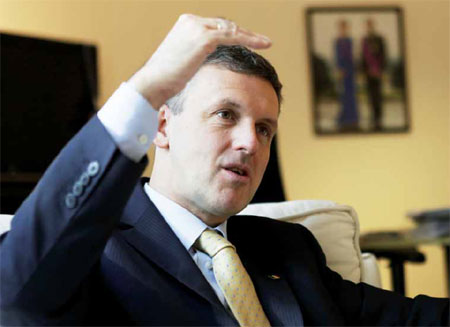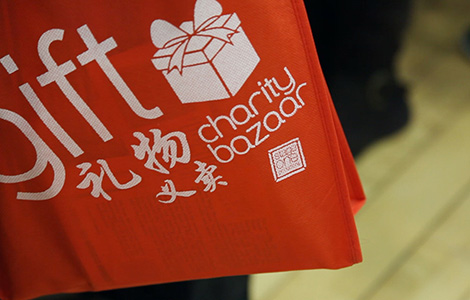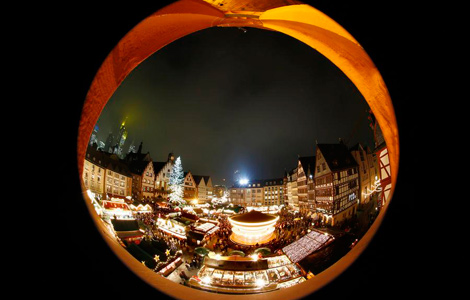Tintin's adventures in diplomacy
Updated: 2013-11-29 10:34
By Liu Weifeng and Fu Chao (China Daily Europe)
|
|||||||||||
Belgian ambassador offers a helping hand to Chinese investors, entrepreneurs and students
Visitors to the Belgian embassy in Beijing are greeted by portraits of Tintin.
Created in 1929, Belgian cartoonist Georges Remi's heroic reporter character welcomes visitors together with billboards honoring the lasting friendship between China and Belgium.
The picturesque backdrop of the elegant mansion sets the tone for a conversation with Belgian Ambassador to Beijing Michel Malherbe.
Because innovation is at the core of the country's national character, it is among those least affected by the European economic crisis of the past few years, and the economic indicators show this, Malherbe says.
In 2012, Belgium ranked fifth worldwide in terms of inbound foreign direct investment, behind the United States, Hong Kong, the United Kingdom and France. And the country is the world's fourth most open economy, according to Ernst & Young's Globalization Index 2012.
"We would be very happy to welcome more Chinese companies to Belgium, and the two countries have seen enormous trade growth in the past 42 years, since the establishment of Sino-Belgian diplomatic ties, while inspiring and enriching each other in the cultural sphere," he says.
Malherbe believes that China's development as a global economic powerhouse not only benefits its own people but also provides opportunities to the entire world economy.
Sino-Belgian trade was only worth $20 million (15 million euros) in 1971, the year diplomatic ties were officially established. However, it has since soared to $26.34 billion, according to the most recent statistics released by China's Ministry of Commerce in 2012.
Automaker Zhejiang Geely Holding Group Co., Ltd made the biggest Chinese investment with its acquisition of Sweden's Volvo, which has a large manufacturing plant in Belgium, Malherbe says. The deal has substantially supported job opportunities in the country. Geely CEO Li Shufu visited the plant a few weeks ago in a delegation led by Chinese Vice-Premier Ma Kai.
With China restructuring its economy and shifting toward a more sustainable mode of development focused on quality, Malherbe says Belgium and China are working on a lot of projects together to strengthen economic ties. The embassy will serve as a bridge to offer advice and help for anyone interested in bilateral trade, investment and cultural exchange.
Statistics show that China is Belgium's largest Asian trading partner of Belgium and its second-largest partner outside the European Union. There are more than 1,500 Belgian companies exporting to China and 300 have invested in China.
The Chinese ambassador to Belgium, Liao Liqiang, told Xinhua that Belgium was one of the first countries in the West to provide China with government loans, export advanced technologies and set up joint ventures on the Chinese mainland. Belgium was also among the first group of Western countries to establish industry investment funds with China.
As elaborated by Malherbe, there are three funds providing capital for companies to launch business partnerships between Belgium and China. In 2012, a 17-million-euro fund was set up by China Investment Corporation, a sovereign wealth fund responsible for managing part of China's foreign exchange reserves, and the Belgian Federal Holding and Investment Corporation. It is managed by private equity group A Capital. The fund was established to help Chinese enterprises to invest in Europe.
Two other funds - the China Belgium Direct Equity Fund of 200 million euros and a venture fund of 13.5 million euros - facilitate trade and investment between the two countries.
In addition to automotive, machinery, metal, chemical and pharmaceutical products - and, of course, beer, chocolate and diamonds - Belgium also recently started exporting pork, pears, bovine semen and live horses to China. Being the world's biggest food market with food imports growing every year, China provides lots of opportunities for countries that have high-quality agricultural food.
Last year, 169 projects funded by China investments were launched in Belgium, an increase of 10.5 percent over 2011. Belgium has attracted Chinese companies such as Huawei, ZTE, Hainan Airlines, Geely, COSCO and Sany Group to open branches there.
A prime investment destination for Asia, Belgium has the advantages of being at the heart of Europe, comprehensive infrastructure and an extensive transport network, Malherbe says.
Home to the port of Antwerp and some of the densest rail and road networks in the world, Belgium is a strategic logistic base and distribution center for all of Europe. It has the world's fourth-most productive labor force and a business-friendly tax system.
According to Eurostat, Belgium has the highest proportion of innovative companies in the EU, just behind Germany and Luxembourg.
Eurostat is a branch of the European Commission which provides statistical information to the institutions of the European Union.
Taking a leading role in such high-tech industries as global biotechnology, chemical processing, environmental protection and pharmaceuticals, Belgian companies are bolstered by massive capital investments in innovation.
For example, the Belgian pharmaceuticals industry is fueled by more than 1.5 billion euros for research each year, accounting for 40 percent of all the private investments in R&D in the country.
"Belgium's strengths in these key areas tally with the strategic industries mentioned in China's 12th Five-Year Plan (2011-15) with a shift to a quality-based mode," he says.
"We are willing to expand the Sino-Belgian collaboration in energy conservation, green building, biomass and environmental protection."
Malherbe says Chinese companies in Belgium specializing in these new high-tech industries or in traditional sectors such as automobiles, machinery and metals, are capable of positioning themselves in the European market with regard to capital and operating capabilities. The biggest difficulty for them may lie in culture differences.
"Investment is not only a matter of money, it is also a matter of people," he says, adding that these companies might need to develop their skills in language and human resources management.
There are exchange programs initiated by universities in Belgium and China, and the two countries have recently signed an agreement to set up a Chinese Cultural Center in Belgium.
The upcoming arrival of a couple of pandas from Sichuan in Southwest China to a zoo not far from Brussels, the capital of Belgium, has already stirred enthusiasm among local media and people.
"Young people who are studying in China or Belgium are very important. They will bridge the cultural differences," Malherbe says.
"We see more and more young people every time we host a meeting. These people-to-people contacts are very important."
The Belgian ambassador encourages Chinese businessmen to adopt the adventurous spirit of Tintin and be bold when it comes to tapping Belgian and European markets, and not to be shy about seeking help from the embassy.
"The doors of the embassy are always open to help Chinese entrepreneurs to get the right information at the very beginning of their prospection and business start-ups," the ambassador says.
Contact writers at liuweifeng@chinadaily.com.cn and fuchao@chinadaily.com.cn
|
Michel Malherbe says Chinese and Belgian companies could cooperate in areas such as energy conservation and green building. Liu Zhe / China Daily |
( China Daily European Weekly 11/29/2013 page28)
Today's Top News
Cameron to arrive with big delegation
China launches moon rover
Honor Cairo Declaration
34th high-speed railway starts
Testing time for China's tea growers
8 dead in police helicopter crash onto Glasgow pub
Xi stresses fight against HIV
Premier's trips bear fruit
Hot Topics
Lunar probe , China growth forecasts, Emission rules get tougher, China seen through 'colored lens', International board,
Editor's Picks

|

|

|

|

|

|





